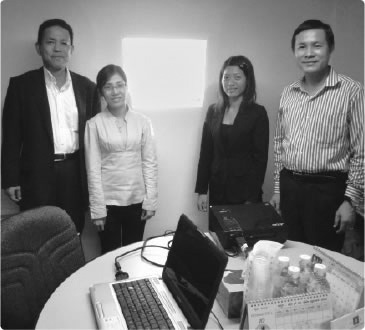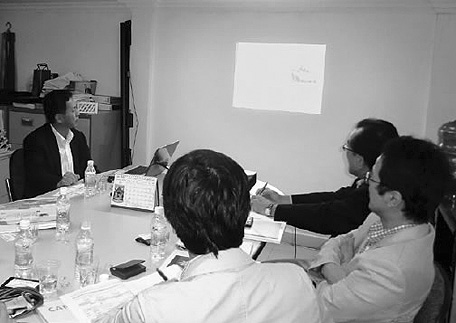Japan's Official Development Assistance White Paper 2011
Column 3
"Give Me a Call, I'm Available 24/7"
—Investment Environment Improvement Assistance in Cambodia—

Mr. Imamura (left) with CDC staff members (Photo: Yuji Imamura)
Cambodia has enjoyed a high economic growth rate averaging about 8% every year since 2001. Following a civil war and reconstruction, it is on the path to full-fledged economic development. Japan has provided Cambodia with assistance in many fields up to now, including basic economic infrastructures like roads, ports, electricity, and telecommunications, on top of agriculture, waterworks, public health, medical care, and education. While continuing these cooperation projects, with the revision of Cambodia's investment law toward inviting foreign direct investment, which is effective for development, in 2003 Japan launched a new form of support in the private sector.
One example of Japan's assistance in improving Cambodia's investment environment is the ODA loan-financed project at Sihanoukville Port, the country's sole international port facing the sea (*1). Development of the special economic zone at Sihanoukville Port started in 2009, and is expected to attract many Japanese businesses leading up to the completion slated for 2011.
JICA expert Yuji Imamura was dispatched as an investment environment adviser to the Japan Desk set up in October 2009 in the Council for the Development of Cambodia (CDC). He offers all sorts of advice to Japanese firms interested in expanding their business into Cambodian markets. "Give me a call if you need anything, I'm available 24/7," he says to clients, giving his email address and mobile phone number.
Mr. Imamura devotes most of his time between Monday and Friday to presentation and consulting sessions with Japanese clients visiting Cambodia. His schedule even extends into the weekend, when he offers them guided tours to local economic zones. He is a busy man. When asked whether his services are more than what is strictly needed, he doesn't budge: "Companies investing in Cambodia still need help from the 'government.' I want to provide all the hospitality I can." Mr. Imamura also holds investment seminars in Japan and neighboring countries, where he introduces Cambodia's political, economic, and social circumstances, and also local lifestyles based on information he has collected himself, in case the firms decide to post employees to a local office—a special touch that is popular with Japanese clients.
The Japan Desk is a busy division now, but when Mr. Imamura was first dispatched there, business was so slow that every so often the staff would disappear in the evening. Mr. Imamura felt it necessary to share with the Cambodian staff his awareness of how their country would change by attracting investors, and what they could do to encourage investment and have people frequent the Japan Desk. For starters, Mr. Imamura polished the guest table alone, after everyone had left, and decorated the entrance with a pot of hibiscus. Gradually, the other staff members started to tidy up their workspaces and voluntarily redecorate the conference room. This was the beginning of the present-day Japan Desk, which is lively all day long with meetings between the staff and visitors seeking consultation on investment.
Cambodia is drawing attention as a "China plus one" or "Vietnam plus one" (a nickname expressing the country as a potential investment destination following China and Vietnam). Mr. Imamura says: "Cambodia today is very similar to the Vietnam in its initial stage of economic growth, back when I lived there as a trading company employee. The events of these several years will determine the success or failure of Cambodia's economic development."
(*1) Sihanoukville Port Special Economic Zone Development Project

Mr. Imamura (left, by screen) explaining investing to a Japanese firm (Photo: Yuji Imamura)
